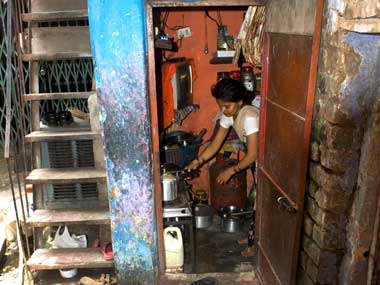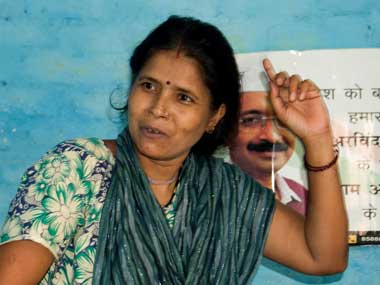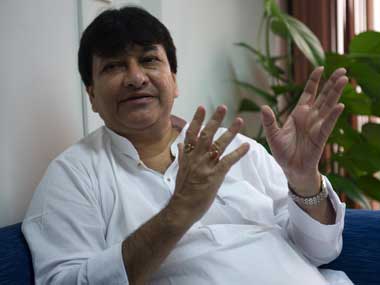Delhi government’s minister for food and civil supplies, the genial Haroon Yusuf insists the novel kerosene-free Delhi scheme is a big hit. The scheme involves converting Delhi’s 3.5 lakh kerosene-users into LPG users by giving them a free LPG connection along with a two-burner stove and a gas cylinder. The scheme, launched in August last year, is being fast-tracked with an eye on the Delhi Assembly elections scheduled later this year. The target is to make Delhi kerosene-free by August 2013 and while doing so win votes for the Congress party. The Sheila Dikshit government which won its third consecutive victory in the 2008 election is aiming for another term in power. (Read report here ) “For some families, it is like a gift from God. They never thought they will have a gas connection. People are very happy,” says the cabinet minister. Explaining the rationale behind the scheme, Yusuf says, “We were getting a lot of complaints about the Public Distribution System (PDS), about beneficiaries not getting their full quota of kerosene oil or being turned away saying there was no stock. Secondly, if you examine the incidents of fire caused in the slum clusters, in most cases, kerosene was the root cause. Thirdly, it was the health aspect. Women were facing a lot of problems because of the pollution due to kerosene. [caption id=“attachment_941489” align=“alignleft” width=“380”]  Minister Haroon Yusuf says it made sense to phase out kerosene from Delhi. Naresh Sharma/ Firstpost[/caption] “And so we thought that gas is a green fuel and it would not cause pollution. For everybody who can’t have a gas connection, this is a dream for them. We have already given gas cylinders to almost 1.39 lakh families,” he said. However, for many slum residents the switch from kerosene oil to LPG doesn’t appear to have gotten off to a flying start. For instance, residents of the Lal Gumbad slum (which falls under the Greater Kailash assembly constituency represented by senior BJP leader VK Malhotra) speak of the desperate times they had to go through because their kerosene oil supply was stopped even before their gas connection arrived and the PDS store refused to give them rations unless they made the switch to LPG. A continuing concern for many seems to be the price of a subsidised gas cylinder (Rs 412). In comparison, the kerosene oil entitlement of 12.5 litres per month at Rs 14.83 per litre cost them only half as much, they point out. Dasrathi, a resident the Lal Gumbad camp, says she is unhappy with the new scheme. “I have only one room which I share with my school-going grand-daughter. I don’t have the space to keep such a large stove and a gas cylinder. And while cooking, the entire room heats up, it is very difficult and inconvenient. And though it is just the two of us, the cylinder lasts us not more than two months. Gas is very expensive for us,” she said. Another resident, Ram Dulare, who works as a watchman, said, “Kerosene oil had its benefits. We could also use it as a repellent for mosquitoes and flies. In our _jhuggie_s, we don’t have the infrastructure for a gas stove. We had to make a stand for Rs 500 to put the stove on it.” Dulare lives with his wife and three children in a jhuggi (hutment) in Lal Gumbad camp. Yusuf, however, insists that while people have spoken of these kinds of problems, the majority of the recipients are happy. [caption id=“attachment_941509” align=“alignright” width=“380”]  Dulare’s wife Sheila, with the new LPG connection. Naresh Sharma/ Firstpost[/caption] Nearly 80 percent of the residents in the Lal Gumbad camp now have a gas connection. Asked whether the scheme would influence how they voted in the next election, a distraught Dulare says, “Inflation is sucking the life out of us. This government seems to want to get rid of the poor. We used to buy kerosene oil for Rs 250 a month. The gas cylinder costs us over Rs 400. How can the poor afford this? The government thinks it giving us a convenience, but it a burden for us.” Expressing another concern, which arose after an LPG cylinder burst in a nearby camp a year ago leaving 11 people injured and two critically, Dasrathi says, “The government has given us each a bomb to keep in our house.” But Suman, also resident of the camp and member citizen’s vigilance initiative called Satark Nagrik Sangathan, sees the LPG connection as a boon for working women like her. “Cooking takes a lot less time now. My work gets done faster. I find it more convenient….We are a family of five and the cylinder lasts me 1 month and 10 ten days,” she said. Anjali Bharadwaj, founder of Satark Nagrik Sangathan, provides the background to introduction of the kerosene-free scheme, said,“Earlier, the Delhi government was providing between 20-22 litres of kerosene oil per month to each family which didn’t have a gas connection. The entitlement was then dropped to 10 litres per month, which was clearly inadequate for a family. After people complained, the entitlement was raised from 10 to 12 litres….The biggest problem with people accessing kerosene oil in Delhi was that there was lot of pilferage of kerosene oil from the kerosene depots. A lot of people have been moving to gas on their own because accessing kerosene oil has been a huge disaster.” But Bharadwaj questions the government’s introduction of the scheme as a response to doing away with pilferage and leakage in the PDS. “What we have been saying is that the government cannot say there is corruption and we cannot do anything about it and so we are going discontinue the scheme. What people want is a corruption-free delivery-system,” she said. Defending the government’s decision, the minister said, “We have implemented the kerosene-free scheme through the delivery system only. The gas connection that is being given is on that basis. So you cannot say that. ” He maintains that the department has received no complaints about the kerosene-free scheme. “At least they are sure of getting a cylinder. A lot of Below Poverty Line and Antyodaya Anna Yojana card holders wanted to get gas connections,” Yusuf said. However, the success of the scheme as a vote-catcher, remains to be seen. In Moti Lal camp, a slum colony located in an assembly constituency that voted for the Congress in 2008, the scheme doesn’t seem to have improved the prospects of the incumbent - Yoganand Shastri – in the coming elections. [caption id=“attachment_941497” align=“alignleft” width=“380”]  AAP’s candidate Rumbo is hoping to capitalise on the discontent over the scheme and against the Congress. Naresh Sharma/ Firstpost[/caption] Parvati, who lives with her son, a vegetable vendor, in the Moti Lal camp is a beneficiary, but says the Congress MLA is not getting her vote this time. While she is happy with LPG connection and doesn’t mind paying Rs 412 for a cylinder since it lasts her two months, she says unchecked rise in prices of vegetables and essentials has shaken her faith in the government. “I am not happy with the how the prices have been rising. How is a family of four to survive?” she asks. Posters of the Aam Admi Party at the entrance of the camp indicate attempts by Arvind Kejriwal to make inroads into traditional Congress strongholds. Rumbo, a resident of the Moti Lal camp, is one of the three candidates short-listed by the party from Munirka. “Soon the Congress government will do away with PDS too. For all these years, people have been using kerosene oil and suddenly the government seems to have woken up to problem of black marketing. They should fix the system, not get rid of it,” she said.
The Congress tried to phase out kerosene from the slums of Delhi but it may not get them the goodwill they anticipate.
Advertisement
End of Article


)
)
)
)
)
)
)
)
)



